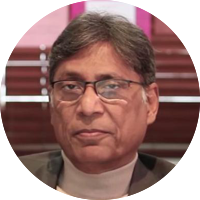Aflatoon (Plato)
Aflatoon (428-27-347 BC), a teacher of Arastu (Aristotle), was a Greek philosopher and a devoted disciple of Suqrat (Socrates). This founder of Platonist school of philosophy has made an ever-lasting impact on the history of ideas. A master philosopher in the domains of ethics, politics, metaphysics and epistemology, he has influenced minds across ages and places. His greatest work, Republic, proposed the idea of an ideal city. He cast a lasting impact in the Arab world when his works reached there through Arabic translations. Islamic philosopher, Al-Farabi’s concept of the “perfect state” is a commentary on Aflatoon’s Republic. Another philosopher, Al-Kindi, who brought in the wave of Neoplatonism in the ninth century, made way for the works of Al-Farabi and Avicenna in the 10th and 11th centuries. However, certain revisions on the idea of Neoplatonism were made in the later part of the 11th century when philosopher Al-Ghazali wrote against it which prompted a counter-critique by Ibn Rushd. Aflatoo’s works like Laws, Sophist, Timaeus and Republic have been widely translated in Arabic and all other major languages of the world and they have made their lasting impact through ages both in the West and the East. Islamic philosophy engages with the relationship between faith and philosophy and aflatoon’s Seventh Epistle comes close to it in a broader way.
Reference: Naaqid-e-aazam hoom mooli pe likhoon mazmoon agar/Baat ka aaghaaz karta hoon main Aflatoon se (Zafar Kamali), Nursery ka daakhla bhi sarsari matt jaaniye/Aap ke bachhe ko Aflatoon hona chahiye (Anwar Masood). Also see: https://www.rekhta.org/ebooks/mukalmaat-e-aflatoon-aflatoon-ebooks
Aflatoon (428-27-347 BC), a teacher of Arastu (Aristotle), was a Greek philosopher and a devoted disciple of Suqrat (Socrates). This founder of Platonist school of philosophy has made an ever-lasting impact on the history of ideas. A master philosopher in the domains of ethics, politics, metaphysics and epistemology, he has influenced minds across ages and places. His greatest work, Republic, proposed the idea of an ideal city. He cast a lasting impact in the Arab world when his works reached there through Arabic translations. Islamic philosopher, Al-Farabi’s concept of the “perfect state” is a commentary on Aflatoon’s Republic. Another philosopher, Al-Kindi, who brought in the wave of Neoplatonism in the ninth century, made way for the works of Al-Farabi and Avicenna in the 10th and 11th centuries. However, certain revisions on the idea of Neoplatonism were made in the later part of the 11th century when philosopher Al-Ghazali wrote against it which prompted a counter-critique by Ibn Rushd. Aflatoo’s works like Laws, Sophist, Timaeus and Republic have been widely translated in Arabic and all other major languages of the world and they have made their lasting impact through ages both in the West and the East. Islamic philosophy engages with the relationship between faith and philosophy and aflatoon’s Seventh Epistle comes close to it in a broader way.
Reference: Naaqid-e-aazam hoom mooli pe likhoon mazmoon agar/Baat ka aaghaaz karta hoon main Aflatoon se (Zafar Kamali), Nursery ka daakhla bhi sarsari matt jaaniye/Aap ke bachhe ko Aflatoon hona chahiye (Anwar Masood). Also see: https://www.rekhta.org/ebooks/mukalmaat-e-aflatoon-aflatoon-ebooks
Additional information available
Click on the INTERESTING button to view additional information associated with this sher.
About this sher
rare Unpublished content
This ghazal contains ashaar not published in the public domain. These are marked by a red line on the left.

